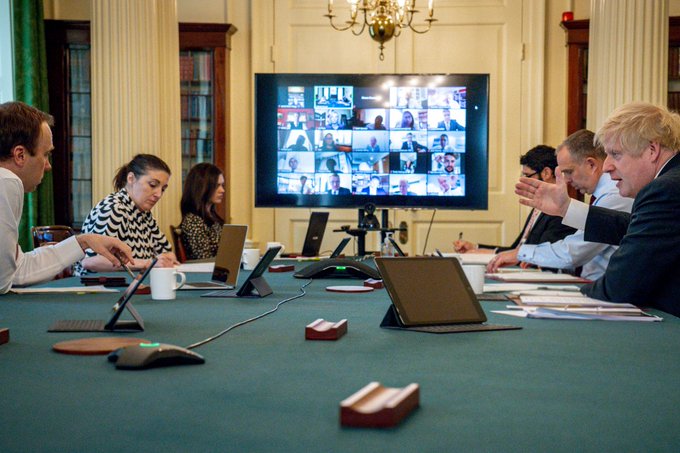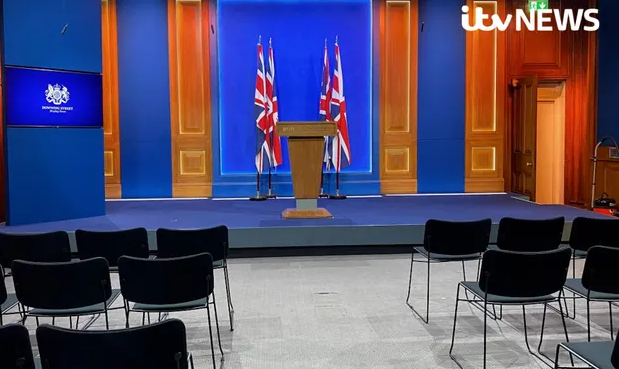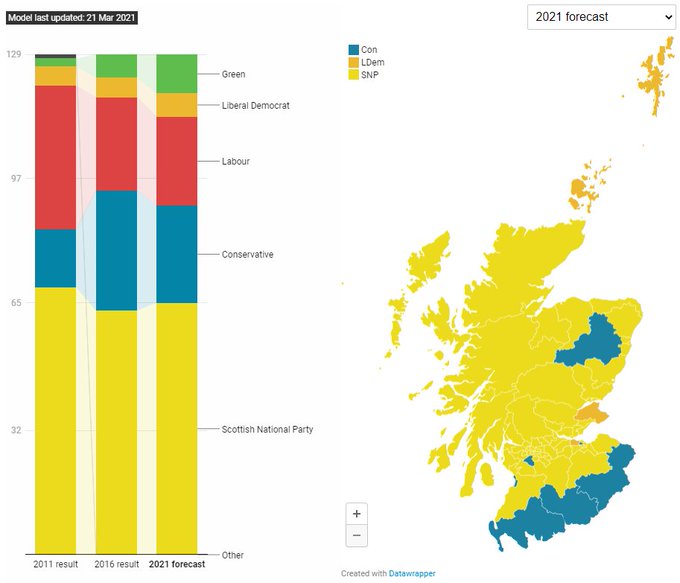On Harry Cole, Doomsday and the new Hyper-Unionism

Harry Cole is the Political Editor of The Sun. In an ‘exclusive’ yesterday he revealed: “a major rift at top of govt last March over how to respond to the emerging pandemic – some in Cabinet think PM should have used sweeping civil contingencies powers to cut out Sturgeon”.
The article “ONE YEAR ON: Boris Johnson was ‘naive’ to give Nicola Sturgeon pandemic powers, Cabinet colleagues claim” reveals much about client journalism but also the perspective from the Cabinet table and even in Cobra meetings.
It shows there are more extreme radical right wing elements within the Cabinet who are champing at the bit to assert authority, barely constrained by the more ‘liberal’ (sic) colleagues:
“The PM was urged by some ministers and aides not to use 1980s Public Health laws to respond – as Health matters are devolved meaning Edinburgh and Cardiff were given the chance to go their own way in response. Instead they wanted Mr Johnson to rely on the doomsday 2004 Civil Contingencies Act which gave Whitehall supreme authority for a “catastrophic emergency”. Insiders say the issue was raised multiple times at Cobra and around the Cabinet table. At one tense early meeting it is understood Commons leader Jacob Rees-Mogg was particularly vocal at using the sweeping Act rather than writing a new law for Covid that sat alongside the 1984 Public Health Act.”
Cole writes: “…insiders say they were blindsided by the fragmented response to the bug across the four nations of the United Kingdom. Scotland and Wales have been able to set their own lockdown measures and easing timetables as a result – at times creating tension with Westminster. The Scottish first minister has been openly critical of the UK government’s response for England, infuriating Whitehall. Not only did the decision lead to confusing different rules for different parts of country, it also saw Nicola Sturgeon’s poll ratings rocket. A former aide who has now left government told The Sun: “At the time I think everyone just assumed there would be a joined up response across the whole country and we didn’t really think at the time it would splinter.”
The perspective assumes a duty of uniformity and neatly puts the blame on the First Minister who is portrayed as a ‘splitter’ and an opportunist when in fact the Scottish Government were studious NOT to exploit the situation and arguably should have diverged much more sharply with Westminster’s disastrous mishandling of the pandemic.
There’s an ominous addendum: A Cabinet Minister said: “I have no doubt that it will be done differently next time. The PM knows that.”
Next time?
It sounds very much like Rees-Mogg and his band wanted Johnson to rely on the doomsday 2004 Civil Contingencies Act which gave Whitehall supreme authority for a “catastrophic emergency” as a means to override devolution and exert Disaster Unionism (a close kin to Disaster Capitalism).
Ironically the only thing preventing this undermining of democracy was that it would have had to be renewed every 30 days by parliament and – as we well know – Johnson has an aversion to parliamentary scrutiny. So, in a cute way, one anti-democratic faction within the Cabinet undermined another anti-democratic faction.
As in the wider narrative Britain is positioned as both saviour and benefactor – but also – ultimately as destroyer.
As I said before the principles arguments for remaining in this Union now rotate through three phases:
You Don’t Exist
We Love You
We May Destroy You
As Britain’s post-Brexit vision sharpens and the Conservatives prepare for defeat at the elections these three phases may become two and the love-phase is increasingly replaced with a harsher message of: “we will give you some military jobs you ungrateful bastards”.

The increasingly embarrassing obsession with flags and symbols is a diminishing return in a country were these same symbols are reviled. The Conservative and Unionist obsession and reliance on these symbols is a sign of living in a hermetically-sealed loop – both culturally and politically – and will continue to cause them unseen damage.
As John Harris wrote this week: “Not since the far-off days of Tony Blair and Cool Britannia have we seen so much of the UK’s national emblem. But now the mood is altogether more wearied and embattled. The flag’s current prominence is partly the work of the government’s new “union unit”, and reflects a set of ideas recently labelled “hyper-unionism” – reducible to a last-ditch, often aggressive attempt to shore up the United Kingdom and the idea of a common British identity as the foundations of both continue to crumble.”
He concludes:
“Shall we at last face the facts? Even if the institutions of the United Kingdom creak on unchanged or are somehow saved by a new federalism, as a meaningful political entity the UK is all but over. Independence is partly a state of mind, and for very different reasons, a large number of people in Scotland, Wales and England have got there already. So, aside from its use whenever the Olympics come round, the union jack may be beyond rescue – best left to the kind of opportunists who think they can use it as they please but fail to grasp the downsides.”
Not only are the Conservative’s engaged in a campaign based on a form of aversion therapy, using the Union Jack as a sort of optical foil to amplify their own ignorance and destroy their own political chances, but their strategic maneuvering is also hapless.
Doomsday
Despite the many glowing but premature obituaries for Sturgeon and for the prospects of the independence movement, the New Statesman today reports: New Scottish parliament forecast: SNP: 65 MSPs (+2) CON: 25 (-6) LAB: 23 (-1) LDEM: 6 (+1) GRN: 10 (+4) Chgs. w/ 2016 result 65 seats needed for a majority.

Both Labour and the Tories have made a massive strategic blunder. Sensing blood and with little other feasible policy options – they have framed the entire campaign on stopping Nicola Sturgeon to motivate their base vote. But by concentrating everything on leadership they have effectively concentrated minds on their weakest element. These polls show an SNP majority before the Hamilton report vindicated the FM. Not only that they show a pro-indy super-majority with the Scottish Green party of 75.
Of course the new Hyper-Unionism may continue in the face of massive defeat to repress democracy and deny a vote. We know that will increase support for independence and Johnson and Co at some point will face a pubic inquiry about their corona-corruption.
Is there hope for the Clown King and his Scottish colleagues? Jamie Blackett (“a conservative and leader of All for Unity (the Alliance for Unity)”) thinks the answer lies with a government of ‘national unity’ in Scotland:
“As the SNP’s share of the vote slides in the wake of the Salmond Inquiry, thanks in part to the Spectator’s persistence, we think we can win a pro-UK majority and enable an anti-nationalist administration – ‘a government of national unity’. It’s proving a hard sell to Tories and Labour alike. But no one thought Fianna Fail and Fine Gael’s coalition, that denies Sinn Fein power, would ever be possible either. It relies on All For Unity winning enough seats to leaven the mix and George Galloway, Chairman of Scottish Labour before many current MSPs were born, being able to tell Labour, from a position well to the Left of them, that they must do the right thing and get into bed with the Tories rather than keep the separatists in power. ”
This is a mirror of the new pro-indy parties – Action for Independence (AFI) – Reform Scotland and the ISP – also all claiming to unite and create broad alliances to game the system. We know none of this will happen and the much heralded storm never comes.
But Blackett’s rhetoric – and the Spectator publishing him – is a sure sign of desperation as the election day looms and the time of reckoning beckons. Belief in the indefatigable St George is as quaint and curious as belief that projecting the Union Jack onto the retina of skeptical Scots is a worthwhile exercise in soft power. Hyper-Unionism will fail and may in failing return to fail again. There certainly seems to be no sign of an alternative plan amongst the sharpest minds at their disposal.
Lent is a period to remove toxic presences from your life – and we are now presented with a fateful opportunity to do just that – to remove the party that treats us with contempt from Scottish politics.
We’re crowdfunding for our future. If you’d like to support us go here:
https://www.crowdfunder.co.uk/backing-bella-2021


Brilliant article..
Focus on Independence……I see wee Nicola on her wee cuddy swinging her wee axe..we just have to be right behind her!
It never seems to have crossed the minds of the febrile individuals in Westminster that if flags were likely to be helpful in preserving the Union (pickled might be a more appropriate term) it would have served their purpose better to have had four national flags plus the Union Jack. As seems clear from their preference for multiple copies of a flag that inspires no love in many parts of the UK and their desire to emblazon it on everything from cheese to tunnels they desire a unitary state and the end of devolution.
You are right of course.
However, displaying the various flags of the UK “family” would break diktat No.1: “You Don’t Exist”
They really can’t change.
Come again? Because the British government uses the British flag this indicates they want to get rid of devolution? Any further comment is superfluous.
“…the doomsday 2004 Civil Contingencies Act which gave Whitehall supreme authority for a “catastrophic emergency”. ”
So, the same people who wanted these sweeping dictatorial powers in a “catastrophic emergency” were the same people who downgraded the status of Covid 19 in order to duck responsibility for not protecting the public.
HM Government: “Status of COVID-19: As of 19 March 2020, COVID-19 is no longer considered to be a high consequence infectious disease (HCID) in the UK. The 4 nations public health HCID group made an interim…”
They want absolute power with no responsibility or accountability. I’m sure there’s a name for that.
There are often references to ‘T he Spectator’ both here and elsewhere but it would be interesting to know what is the readership of ‘The Spectator’ in Scotland and who reads it. Does anyone have any figures or information? My gut feeling is that it is read primarily in London and is not widely influential within Scotland but that is just a hunch. Perhaps Conservative MSPs are briefed with suitable extracts.
The Spectator might only be widely read in London. However, it has its influence multiplied greatly by the fact that BBC news programmes regularly quote it’s articles and invite it’s contributors onto current affairs programmes.
It seems to be a “go to” source for London editors and therefore the whole of the UK gets to hear its voice.
Indeed !
”What the Papers Say” ( the London papers ,that is ) on BBC and Sky each evening frequently have contributions from journos from The Spectator , so their view/slant on the ‘news’ is widely disseminated .
The editor, Fraser Nelson, and the publisher, Andrew Neill, are both Scots and both are hostile to independence or indeed any concept of the public good. Their origins, “prove” to the Spectator readership, that it is ‘telling it as it is’, with regard to Scotland and thus confirms their bias about whingeing Jocks, ungrateful and always holding out the begging bowl. And, their “Scottishness” guarantees their employment as pundits by the “Scottish” media.
[Disclaimer: PG – Paternal Guidance Suggested. The following might not be suitable for reading. This heteronymous post questions the assumptions that inform the above article and/or the comments that have been made by some of its other commentators; its poster has nothing substantive to say for her/himself. Readers are urged to seek paternal guidance as to its suitability for reading from one of the site’s self-appointed arbiters.]
The Spectator is one of the magazines to which I have an online subscription. I read it to get the conservative view. I try to take in as many different and mutually antidotal perspectives as I can ‘To dodge the curst conceit o’ bein’ richt/ That damns the vast majority o’ men.’
I know it’s a heretical text, but I don’t know how many people north of the Solway are guilty of reading it. Those who do are clearly exposing their souls to great danger.
Perhaps The Spectator too should carry a paternal rating, or simply be proscribed altogether as a forbidden text and placed on some index of the same.
If Bellacaledonia really wants to go after anti-democratic unionism, the obvious line (I would have thought) is to go after the still-very-much-existing Empire. Why not commission or syndicate some relevant content from all those outer provinces which often do not have any democratic say against their imperial overlords (as the UN’s decolonisation people tirelessly point out):
https://en.wikipedia.org/wiki/British_Overseas_Territories
and some that do have only very recently got their own parliaments or whatever. Do they have free presses? How do they manage dissent? Are their Queen-picked governors still dyed-in-the-wool anti-democratic imperials? Who knows? There’s always some interesting stories to be found (Richard Norton-Taylor seems interested in the cultural history of Little Sai Wan station in Hong Kong, for example).
Fine. I listen to the Spectator podcast occasionally. I don’t agree with them particularly. I don’t agree with the Nationalists either. Born, educated in, and loyal to Scotland to the extent of choosing to live here when it might not have been to my best economic advantage to do so, I find no difficulty in reconciling my Scottish and British identities. It is not an ‘either or’. This is the problem of nationalism generally. There’s been some ropey doings up here last few years but if you’re on one or other side you can justify what is basically cronyism and lack of accountability. I despise the small world mindset. Let’s aspire to live in a society that lives up to our best desires – I don’t care what we call that country or its geographical boundaries. I doubt it’s limited to the mediaeval kingdom of Scotland. James III murdered by his rebellious son in 1488 thought he could be Holy Roman Emperor. He wasn’t but you can’t fault his ambition…
”There’s been some ropey doings up here last few years ” and ”I despise the small world mindset ”.
There’s been some ropey doings elsewhere in these islands recently too and much evidence of a ”small world mindset ” . You’ve probably heard of Brexit , eh ?
Yes , let’s live in a society that ”lives up to our best desires ”- but it ain’t the UK !
Here’s a thing. I was talking about Brexit. There’s no ‘good’ nationalism. There’s people who don’t understand history and hate their neighbours. Narcissism of small differences. Lots of other quotes I can’t even begin to bother with. Because there’s no point at all.
[Disclaimer: PG – Paternal Guidance Suggested. The following might not be suitable for reading. This heteronymous post questions the assumptions that inform the above article and/or the comments that have been made by some of its other commentators; its poster has nothing substantive to say for her/himself. Readers are urged to seek paternal guidance as to its suitability for reading from one of the site’s self-appointed arbiters.]
There’s surely no good nationalism that’s based on geography and/or history, which excludes from ‘the nation’ and underprivileges anyone and everyone who isn’t of that place and/or that biological or cultural heritage.
However, there’s also a nationalism that’s based on shared citizenship rather than on nativity, and which built around jurisdiction rather than ethnicity.
This kind of nationalism privileges no lineage or culture over any other; no citizen need assimilate to a ‘host’ culture to count as a national, but only pledge allegiance to the political constitution of our common affairs or ‘res publica’.
This is a nationalism that associates people not necessarily by blood or heritage, but voluntarily by concilium or (in the case of republics like post-apartheid South Africa) by reconcilium.
It’s this agreement, rather than any specific identity, that binds us together as a nation, giving us equally, without privilege, civic responsibilities on the one hand and civil rights on the other.
Under this kind of multicultural, cosmopolitan, borderless ‘civic’ nationalism, the nation is nothing but a voluntary agreement between free and equal citizens to live together peaceably, despite whatever biological or cultural differences might otherwise divide them, and without the sort of privileging or colonisation that marks ethnic nationalism.
All nationlism ultimately reverts to ‘blood and soil’. Its in the nature of the beast.
[Disclaimer: PG – Paternal Guidance Suggested. The following might not be suitable for reading. This heteronymous post questions the assumptions that inform the above article and/or the comments that have been made by some of its other commentators; its poster has nothing substantive to say for her/himself. Readers are urged to seek paternal guidance as to its suitability for reading from one of the site’s self-appointed arbiters.]
Well, no; it’s not the nature of the beast at all.
The nation isn’t a natural phenomenon, but a historical one. The nation as a racially defined community (‘blood’) united within a given settlement area (‘soil’) has its ideological origins in 19th-century romanticism and reached its apogée in Germany in the 1930s and ‘40s, since when it’s been in decline.
Some anachronists within nationalism do still define the nation in terms of ethnicity – i.e. in terms of a shared biological and/or cultural heritage – but this tendency is being selected against by history as more and more of our traditional ‘settlement areas’ become increasingly multiracial and/or multicultural in their population (just ask the poor Gaels).
These reactionary nationalists are, of course, at the root of xenophobia that still blights nationalist movements throughout Britain and Europe. However, it’s heartening to see those movements developing, mainly through their youth, more multiracial and/or multicultural forms, in which the nation is defined more timely in terms of civitas – i.e. in terms of shared political institutions – rather than in terms of Blut und Boden.
As the world changes, so the old romantic nationalism of the modern epoch is withering away, displaced by the insurgence of a more pragmatic nationalism that’s better fitted to thrive in the plurality that is increasingly our mongrelised postmodern condition.
So the concept of the blood and soil nationalism has been in decline since 1945?
Try telling that to the peoples of the Balkans/Africa/China/former states of the Soviet Union/middle east/Vietnam/cambodia…..i could go on and on.
Indeed! As I said, reactionary nationalists are at the root of the xenophobia that still blights our worlds. But they are, like Canute, being selected against by history.
This isn’t to a that we needn’t work to consolidate the revolution by instituting robust democratic political structures that will a) decolonise the myriad associations that comprise our society as a whole and b) prove those associations against the future privileging of any racial, cultural, or ideological group (‘identity’) over any other; that is, against their future recolonisation.
To insist that Blut-und-Boden nationalism is the nature of the beast – that it’s ‘ay bín’ and therefore somehow necessary – is a counsel of despair.